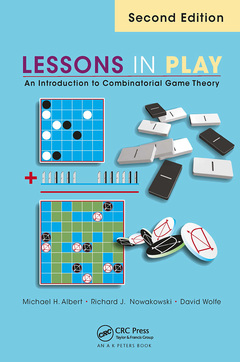Lessons in Play (2nd Ed.) An Introduction to Combinatorial Game Theory, Second Edition
Auteurs : Albert Michael, Nowakowski Richard, Wolfe David

This second edition of Lessons in Play reorganizes the presentation of the popular original text in combinatorial game theory to make it even more widely accessible. Starting with a focus on the essential concepts and applications, it then moves on to more technical material. Still written in a textbook style with supporting evidence and proofs, the authors add many more exercises and examples and implement a two-step approach for some aspects of the material involving an initial introduction, examples, and basic results to be followed later by more detail and abstract results.
Features
- Employs a widely accessible style to the explanation of combinatorial game theory
- Contains multiple case studies
- Expands further directions and applications of the field
- Includes a complete rewrite of CGSuite material
Combinatorial Games
0.1 Basic Terminology
Problems
1 Basic Techniques
1.1 Greedy
1.2 Symmetry
1.3 Parity
1.4 Give Them Enough Rope!
1.5 Strategy Stealing
1.6 Change the Game!
1.7 Case Study: Long Chains in Dots & Boxes
Problems
2 Outcome Classes
2.1 Outcome Functions
2.2 Game Positions and Options
2.3 Impartial Games: Minding Your Ps and Ns
2.4 Case Study: Roll The Lawn
2.5 Case Study: Timber
2.6 Case Study: Partizan Endnim
Problems
3 Motivational Interlude: Sums of Games
3.1 Sums
3.2 Comparisons
3.3 Equality and Identity
3.4 Case Study: Domineering Rectangles
Problems
4 The Algebra of Games
4.1 The Fundamental Definitions
4.2 Games Form a Group with a Partial Order
4.3 Canonical Form
4.4 Case Study: Cricket Pitch
4.5 Incentives
Problems
5 Values of Games
5.1 Numbers
5.2 Case Study: Shove
5.3 Stops
5.4 A Few All-Smalls: Up, Down, and Stars
5.5 Switches
5.6 Case Study: Elephants & Rhinos
5.7 Tiny and Miny
5.8 Toppling Dominoes
5.9 Proofs of Equivalence of Games and Numbers
Problems
6 Structure
6.1 Games Born by Day 2
6.2 Extremal Games Born By Day n
6.3 More About Numbers
6.4 The Distributive Lattice of Games Born by Day n
6.5 Group Structure
Problems
7 Impartial Games
7.1 A Star-Studded Game
7.2 The Analysis of Nim
7.3 Adding Stars
7.4 A More Succinct Notation
7.5 Taking-and-Breaking Games
7.6 Subtraction Games
7.7 Keypad Games
Problems
8 Hot Games
8.1 Comparing Games and Numbers
8.2 Coping with Confusion
8.3 Cooling Things Down
8.4 Strategies for Playing Hot Games
8.5 Norton Products
Problems
9 All-Small Games
9.1 Cast of Characters
9.2 Motivation: The Scale of Ups
9.3 Equivalence Under
9.4 Atomic Weight
9.5 All-Small Shove
9.6 More Toppling Dominoes
9.7 Clobber
Problems
10 Trimming Game Trees
10.1 Introduction
10.2 Reduced Canonical Form
10.3 Hereditary-Transitive Games
10.4 Ordinal Sum
10.5 Stirling-Shave
10.6 Even More Toppling Dominoes
Problems
Further Directions
1 Transfinite Games
2 Algorithms and Complexity
3 Loopy Games
4 Kos: Repeated Local Positions
5 Top-Down Thermography
6 Enriched Environments
7 Idempotents
8 Mis`ere Play
9 Scoring Games
A Top-Down Induction
A.1 Top-Down Induction
A.2 Examples
Michael Albert - University of Otago
Richard Nowakowski - Dalhousie University
David Wolfe - Dalhousie University
Date de parution : 01-2023
15.6x23.4 cm
Date de parution : 04-2019
15.6x23.4 cm
Thèmes de Lessons in Play :
Mots-clés :
Dyck Path; Combinatorial Game Theory; Vice Versa; Nim Heap; Impartial Games; Induction Purposes; Left Options; Hasse Diagram; Prep Problem; Game Trees; Combinatorial Game; Toppling Dominoes; Left Wins; Game Subtraction; Outcome Class; Left Stop; Ordinal Sum; Atomic Weight; Reversible Option; Star Graphs; Loopy Games; Tic Tac Toe; Heap Size; Subtraction Set; Partial Order



